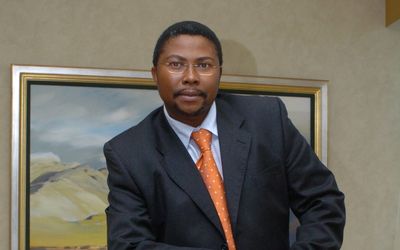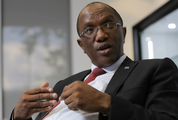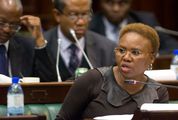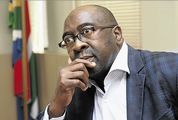Transnet and Eskom find infrastructure funders
by Andiswa Maqutu and Charlotte Mathews,
2015-11-24 05:59:00.0
TRANSNET and Eskom, which have embarked on some of the country’s biggest infrastructure projects, have raised billions to continue the work.
The state-owned freight and logistics company has secured R12bn for its locomotive programme, while the power utility has raised R2.36bn in loans and grants from French entities for the expansion of its distribution network and knowledge sharing.
The Transnet transaction brings to R48bn the capital that it has raised to buy locomotives. The parastatal has pegged the programme at R50bn.
Transnet sourced the R12bn via a club loan from Absa, Nedbank and Bank of China, which will each provide R3bn, while Futuregrowth Asset Managers and Old Mutual Specialised Finance will each lend R1.5bn.
But Transnet acting CE Siyabonga Gama on Monday decried the fact that the private sector was sitting on "a pile of cash" on "balance sheets", which needed to be turned into investments to grow the economy.
"The cash on those balance sheets needs to be turned into investments. We need to bolster our economy by indicating we have confidence. We are one of those emerging economies that still have quite a lot to do," he said.
The R12bn loan has a 15-year term with a four-and-half-year grace period from the first drawdown.
The funding will help finance a deal to procure 1,064 locomotives from Bombardier, General Electric, China South Rail and China North Rail.
Of these locomotives, 994 will be manufactured in SA and there will be a 60% local content requirement.
When Transnet began its 10-year infrastructure renewal programme valued at R340bn-R380bn, it expected 2%-3% economic growth this year.
But this is down to 1.5%, because the "headwinds have changed direction" and SA was experiencing muted economic growth, Mr Gama said.
Transnet would continue with its counter-cyclical approach to infrastructure investment and the private sector had to be encouraged to do the same, he said.
Independent economist Roelof Botha said infrastructure remained the preserve of the public sector as the private sector did not have the authority to build roads, dams and railways.
RMB credit analyst Elena Ilkova said Transnet, as well as most other borrowers, was paying more for loans compared with last year.
Meanwhile, Eskom’s finances have deteriorated over the past few years as its new power stations have run over time and over budget, and it has relied on costly diesel power generation.
In March, Standard & Poor’s downgraded its credit rating to junk, which makes its debt more expensive.
Eskom’s funding goal for the current financial year is R51bn. It releases its interim results on Tuesday.
It has signed a 25-year, €150m credit facility with Agence Française de Développement, an arm of the French government, which will be used for distribution projects in KwaZulu-Natal, the Eastern Cape and Limpopo. This will include upstream grid reinforcement to accommodate renewable energy generation.
The loan would "improve Eskom’s diversification of its funding sources given its terms, long tenor and low interest rate, when comparing it to other available sources", chief financial officer Anoj Singh said.
Eskom’s 10-year bond currently trades at 9.3%.
The French agency and power provider Électricité de France have also agreed to grant Eskom €450,000, which does not have to be repaid, for knowledge exchange.

Siyabonga Gama. Picture: BUSINESS DAY
TRANSNET and Eskom, which have embarked on some of the country’s biggest infrastructure projects, have raised billions to continue the work.
The state-owned freight and logistics company has secured R12bn for its locomotive programme, while the power utility has raised R2.36bn in loans and grants from French entities for the expansion of its distribution network and knowledge sharing.
The Transnet transaction brings to R48bn the capital that it has raised to buy locomotives. The parastatal has pegged the programme at R50bn.
Transnet sourced the R12bn via a club loan from Absa, Nedbank and Bank of China, which will each provide R3bn, while Futuregrowth Asset Managers and Old Mutual Specialised Finance will each lend R1.5bn.
But Transnet acting CE Siyabonga Gama on Monday decried the fact that the private sector was sitting on "a pile of cash" on "balance sheets", which needed to be turned into investments to grow the economy.
"The cash on those balance sheets needs to be turned into investments. We need to bolster our economy by indicating we have confidence. We are one of those emerging economies that still have quite a lot to do," he said.
The R12bn loan has a 15-year term with a four-and-half-year grace period from the first drawdown.
The funding will help finance a deal to procure 1,064 locomotives from Bombardier, General Electric, China South Rail and China North Rail.
Of these locomotives, 994 will be manufactured in SA and there will be a 60% local content requirement.
When Transnet began its 10-year infrastructure renewal programme valued at R340bn-R380bn, it expected 2%-3% economic growth this year.
But this is down to 1.5%, because the "headwinds have changed direction" and SA was experiencing muted economic growth, Mr Gama said.
Transnet would continue with its counter-cyclical approach to infrastructure investment and the private sector had to be encouraged to do the same, he said.
Independent economist Roelof Botha said infrastructure remained the preserve of the public sector as the private sector did not have the authority to build roads, dams and railways.
RMB credit analyst Elena Ilkova said Transnet, as well as most other borrowers, was paying more for loans compared with last year.
Meanwhile, Eskom’s finances have deteriorated over the past few years as its new power stations have run over time and over budget, and it has relied on costly diesel power generation.
In March, Standard & Poor’s downgraded its credit rating to junk, which makes its debt more expensive.
Eskom’s funding goal for the current financial year is R51bn. It releases its interim results on Tuesday.
It has signed a 25-year, €150m credit facility with Agence Française de Développement, an arm of the French government, which will be used for distribution projects in KwaZulu-Natal, the Eastern Cape and Limpopo. This will include upstream grid reinforcement to accommodate renewable energy generation.
The loan would "improve Eskom’s diversification of its funding sources given its terms, long tenor and low interest rate, when comparing it to other available sources", chief financial officer Anoj Singh said.
Eskom’s 10-year bond currently trades at 9.3%.
The French agency and power provider Électricité de France have also agreed to grant Eskom €450,000, which does not have to be repaid, for knowledge exchange.




















Change: 0.19%
Change: 0.22%
Change: 0.44%
Change: 0.46%
Change: -2.07%
Data supplied by Profile Data
Change: 0.98%
Change: 0.22%
Change: 0.19%
Change: 0.00%
Change: 0.12%
Data supplied by Profile Data
Change: 0.89%
Change: 0.74%
Change: 0.15%
Change: 0.44%
Change: 0.20%
Data supplied by Profile Data
Change: -0.46%
Change: -0.62%
Change: -0.35%
Change: -0.70%
Change: -1.37%
Data supplied by Profile Data